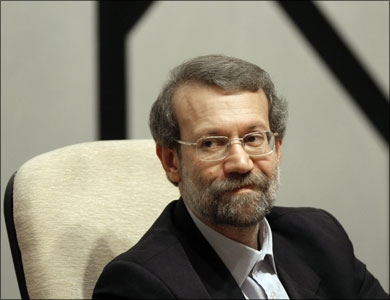Thursday 25 October 2012 - 16:48
Story Code : 8718
Larijani: president Ahmadinejad must abide by constitution
Iranian president expressed his wish to visit the prison after Javanfekr's imprisonment.
"I am accused of protecting the offenders, yet I have always said that the verdict against Javanfekr was not fair. However, the trial is now over, and he has taken his punishment," the president wrote in his letter.
Javanfekr was charged with publishing material contrary to Islamic norms and human values in a special issue of Khatun. He was also accused of insults of Iran's Supreme Leader Ayatollah Ali Khamenei.
After Javanfekr's imprisonment, Ahmadinejad expressed his regret over the imprisonment.
In response to Ahmadinejad's first letter, Judiciary Spokesman and Attorney General Gholam-Hossein Mohseni-Ejei had said on Sunday that visiting Evin Prison was a secondary issue, while the country's main priority was resolving economic problems.
However, Larijani on Wednesday responded to the president's "incorrect remarks and unreal accusations", saying the Article 156 of the Iranian Constitution emphasizes the independence of the Judiciary.
"The judiciary chief... is the highest ranking-level official of the Judiciary. According to law, courts and affiliated organizations are part of the Judiciary. Thus, how do you say that an inspection of prisons needs no coordination with and agreement by the Judiciary?" he said in a letter to Ahmadinejad.
According to the Constitution, the Guardian Council is the official source to interpret the Constitution; the Guardian Council has explicitly announced that the president "has no right to supervise the implementation of the Constitution," he added.
He urged the Iranian chief executive to respect the Constitution, as the document of the nation's basic rights, if he is really "concerned about the protection of the people's fundamental rights."
Larijani said he does not totally oppose the president's visit to the prison and that he has clearly told Justice Minister Morteza Bakhtiari to tell the president that it is not expedient to visit the prison at the current juncture.
However, it is up to me to determine this expediency, the judiciary chief pointed out.
He added that the president's intention to visit prisons and certain courts is a violation of the limits of his duties and interference in judicial affairs.
Larijani emphasized that in line with his duties, he would firmly prevent any breach of the law and improper interference.
The Iran Project is not responsible for the content of quoted articles.
# Tags











